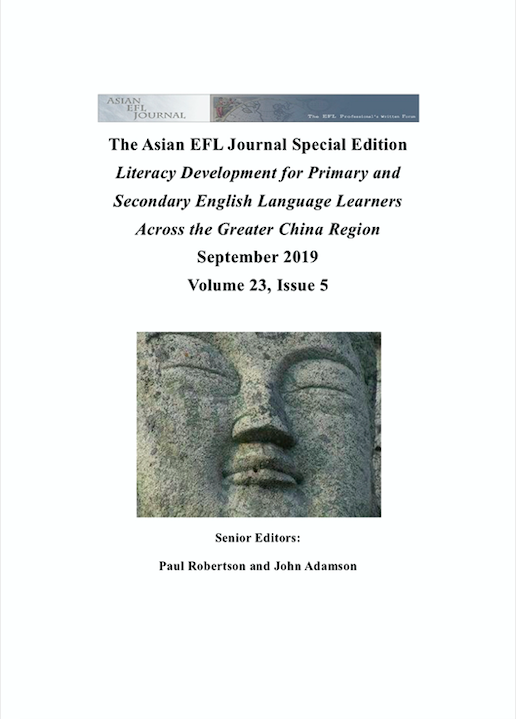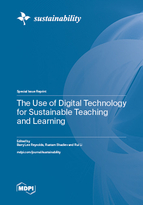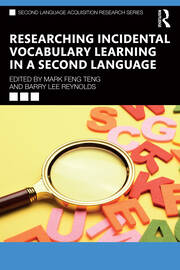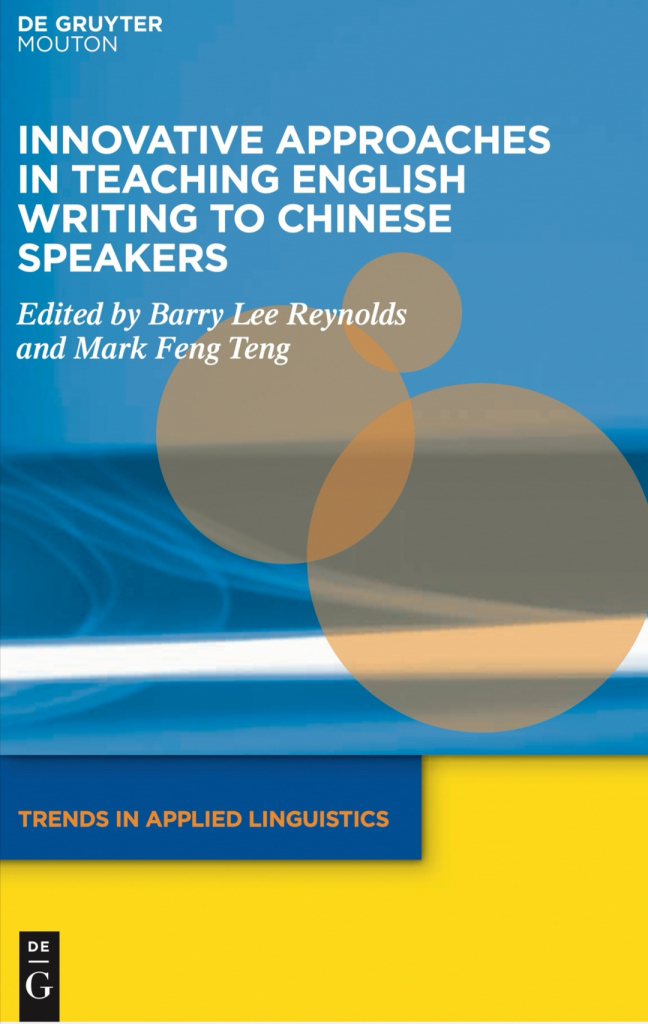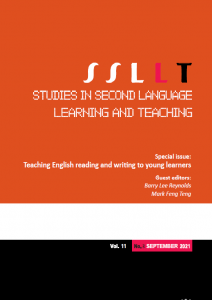Edited Books
Reynolds, B.L., Shadiev, R., & Li, R. (2024). The Use of Digital Technology for Sustainable Teaching and Learning. Basel: MDPI. (ISBN: 978-3-7258-2332-1)
About this Book
Sustainable teaching and learning refer to practices in which teachers equip students with the skills and strategies for engaging in lifelong independent learning that is not defined by the walls of a classroom or dependent on a knowledgeable sage. Teachers that promote sustainable learning practices have ensured students’ engagement in experiential project-based learning tasks that require research, critical thinking, and collaboration. These teachers have the understanding that students should leave their classrooms appreciating that both formal and informal education is continuously being reshaped by emerging digital technologies. Students should realize that these technologies provide affordances for independent and autonomous learning practices that were not available to previous generations and have gained an understanding of how to use them to their advantages. There is a need for research that can underscore how technologies can be harnessed by students as an aid for skill attainment to become lifelong learners. This collection of articles highlights how the use of digital technology can ensure sustainable teaching and learning practices in a time when an influx of uncertainties is upon us.
Teng, M.F., & Reynolds, B.L. (2025). Researching Incidental Vocabulary Learning in a Second Language. New York: Routledge. (ISBN: 9781032219868)
About this Book
Incidental language acquisition is the language that is learned informally, outside the constraints of the typical classroom, and vocabulary is one of the key elements in language learning and knowledge. This unique text is the first comprehensive overview and hands-on methodological guide for researching second language (L2) incidental vocabulary acquisition.
Expert contributors from around the world synthesize the state of the art by defining key concepts and laying out the major theoretical perspectives, research methodologies, empirical findings, and pedagogical considerations involved in incidental L2 vocabulary learning research. By connecting research techniques to the theory that underpins them, detailing practical steps for designing and conducting rigorous new studies, and highlighting areas that deserve additional research attention, they further set the agenda for future work in this field and put readers in a strong position to understand and carry out this research independently.
This book will be an invaluable resource to advanced students and researchers of second language acquisition, vocabulary studies, applied linguistics, education, and related areas.
Chiu, K.T., Hui, Y.K., Yang, D., Lee, L.-K., Wong, L.-P., & Reynolds, B.L. (2024). 2024 International Symposium on Educational Technology: Artificial Intelligence in Education. IEEE. (ISBN: 978-8-3503-6141-4)
About this Book
Welcome to the 10th International Symposium on Educational Technology (ISET 2024) held in conjunction with the 17th International Conference on Blended Learning (ICBL 2024) held at Galaxy International Convention Center, Macao, China on 29 July – 1 August 2024.
Broadly covering instructional technology, information and communication technology for educational purposes, educational technology aims to enhance learning effectiveness and enrich the learning experience through the effective and innovative use of technology. It has become an irreversible force driving changes in teaching and learning practices, not only in the learning materials but also in the learning process. ISET 2024 is a platform for knowledge exchange and experience sharing among researchers and practitioners in the field.
The theme of ISET 2024 is Technological Innovations: Intelligent Computing in Education. In the last couple of years, technology-mediated learning has become part of the new normal after the COVID- 19 pandemic. On the other hand, the use of intelligent computing and technology such as generative AI started to evolve as mature tools for teaching and learning. Our focus is therefore placed on the effective and innovative use of intelligent computing in teaching and learning. Selected papers broadly cover Artificial Intelligence, Generative Artificial Intelligence, Learning Analytics, Virtual Reality and Augmented Reality, Innovative, Blended, and Collaborative Learning, Smart Technologies, Platforms and Environments, Big Data and Network Analysis, and Gamification.
ISET 2024 received 158 submissions, of which 88 papers were accepted. We thank the international programme committee members for their meticulous job in selecting papers for publication. We are grateful to the conference organizers and co-organizers for providing various support. A special thanks to the IEEE Macau Section, which kindly provided technical sponsorship. Finally, we must thank the authors for their quality submissions and enthusiastic participation in making ISET 2024 a successful and fruitful experience for everyone involved.
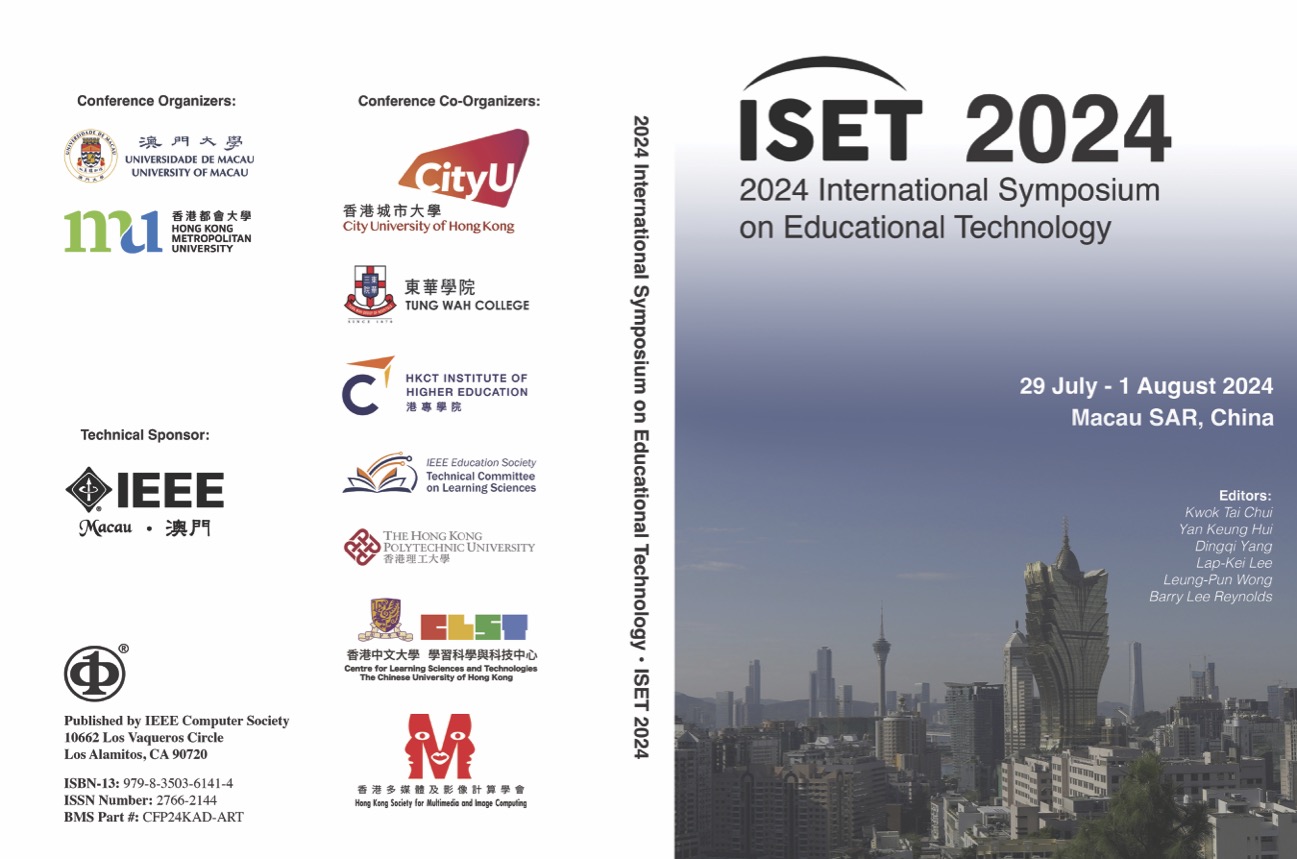
Reynolds, B.L. (2023). Vocabulary learning in the wild. Singapore: Springer. (ISBN: 978-981-99-1489-0)
About this Book
This book provides a timely and valuable resource to explore second language vocabulary learning outside the formal language learning classroom. Rapidly evolving technology and the increasing impact of the global village have resulted in dramatic changes to and increased occasions for second language vocabulary learning. This book offers new and valuable insights into the radically different opportunities both the physical and digital wild provide for language learners to increase their vocabulary knowledge. Practical advice is also given on how second language teachers can integrate vocabulary learning in the wild into their formal classroom instruction. This collection of cutting-edge studies by international experts working within the fields of second language teaching and learning, second language acquisition, applied linguistics, informal language learning, and technology enhanced learning offers an essential resource for language teachers and researchers.
Reynolds, B.L., & Teng, M.F. (2021). Innovative Approaches in Teaching English Writing to Chinese Speakers. Berlin: De Gruyter Mouton. (ISBN: 978-1-5015-1779-2)
About this Book
Informed by theory, research, and classroom practice, the volume provides a systematic overview of critical L2 writing issues. Additionally, with the aim to support instruction across all levels of education for Chinese speakers, this book introduces pre-service and in-service teachers to new teaching ideas, techniques, and practice.
Reynolds, B.L., & Teng, M.F. (2019). English Literacy Instruction for Chinese Speakers. Singapore: Palgrave Macmillan. (ISBN: 978-981-13-6652-9)
About this Book
Written with an emphasis on instruction, policy, practice, and assessment, this book focuses on English literacy at the pre-primary/primary, secondary, and university level, and discusses literacy policies in the region. An easy-to-read, solidly grounded book, it offers practical, thought provoking resources for classroom teachers and educators. It notably features explanations of key literacy skills, up-to-date research findings, and classroom applications that are contextualized for mainland China, Hong Kong, Macau, and Taiwan. This book provides pre-service and in-service teachers, English classroom practitioners, language teacher educators, literacy researchers, and students in research/teacher training programs a core set of instructional techniques on how to incorporate literacy-related ideas into English language classrooms. A valuable pedagogical resource for teaching and learning L2/EFL literacy, this book also highlights discussions on language and literacy policies and new examples of actual classroom teachers that have put English literacy instruction into practice.
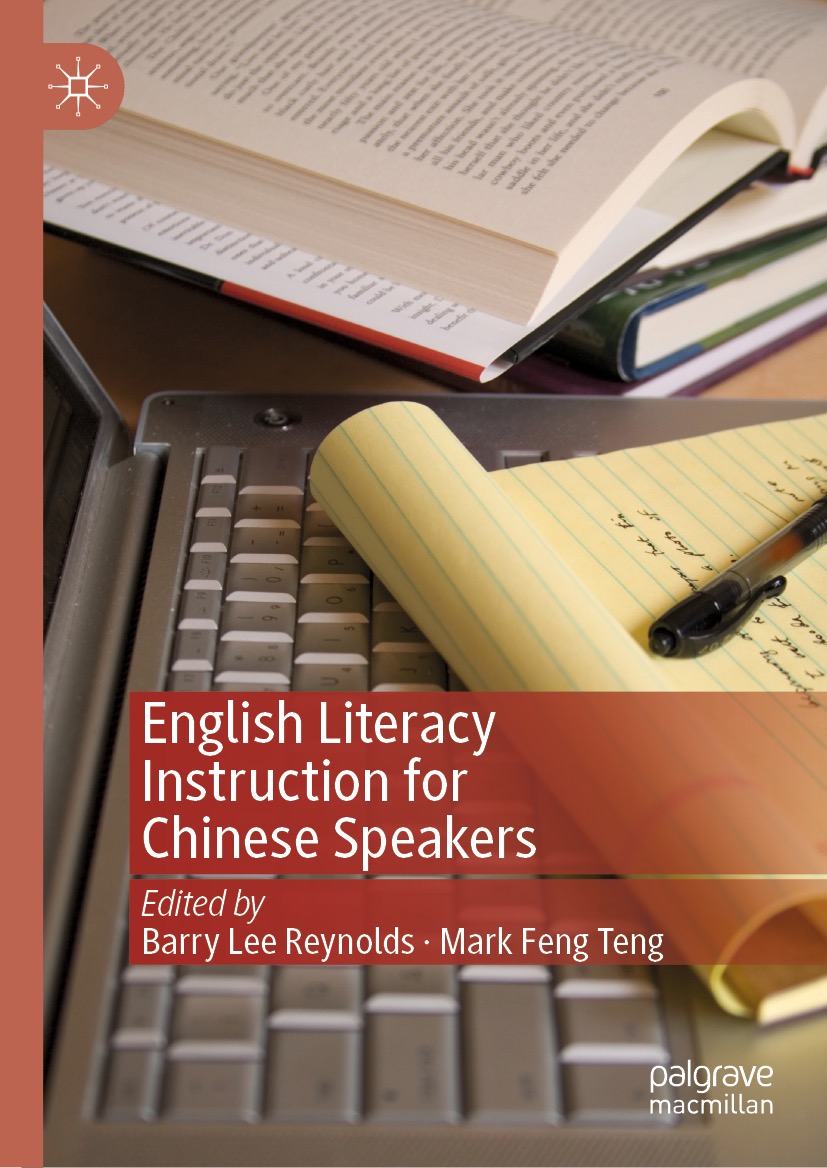
Li, M.Y. & Reynolds, B.L. (2017). (Eds.) Research into Second Language Chinese and English Literacy Instruction. Taoyuan, Taiwan/Taipei, Taiwan: National Central University Press & Yuan-Liou Publishing Co., Ltd. (ISBN: 9789865659165)
About this Book
Research into Second Language Chinese and English Literacy Instruction represents the cross-fertilization of ideas between educators and researchers of Chinese and English as second languages. Covering issues of curriculum, academic literacy, and corpora for data driven learning, the chapters in this volume are written in a clear and understandable style, providing an up-to-date look into the teaching and learning of L2-English and L2-Chinese in the Taiwan context. Written and edited by second language researchers and teachers, this volume is intended not only as a reference for second language researchers but also as resource for language teachers and other school practitioners that deal with educating English and Chinese language learners.
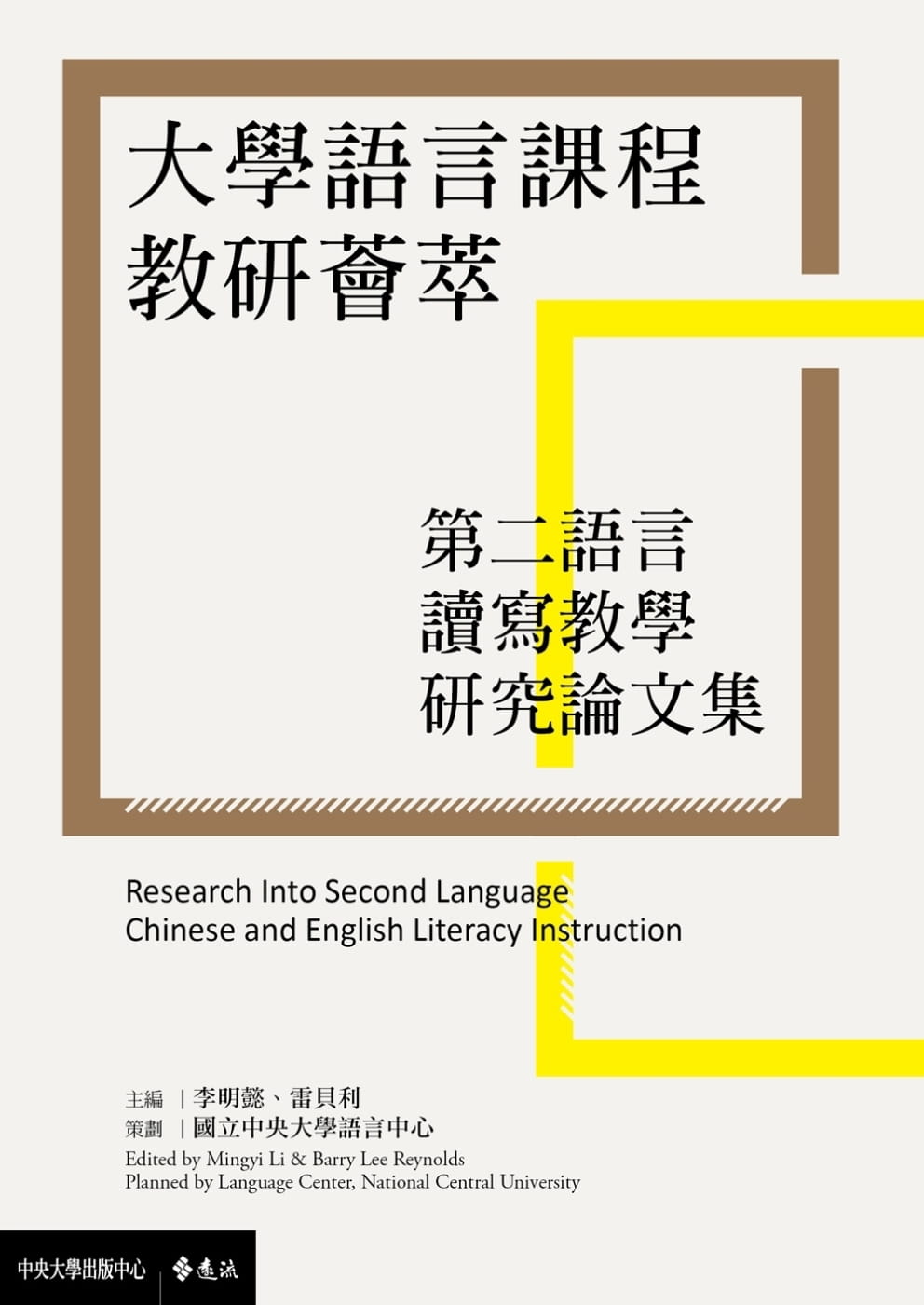
Wible, D., Li, M.Y., & Reynolds, B.L. (2013). (Eds.) Second Language Reading and Writing: Investigations into Chinese and English. Jhongli, Taiwan/Taipei, Taiwan: National Central University Press & Yuan-Liou Publishing Co., Ltd. (ISBN: 978-986-03-6856-7)
About this Book
The International Conference on Chinese and English as a Second Language (C/ESL) was organised by the Language Centre of National Central University in May of 2009 as the fourth such conference hosted bi-annually to foster an interchange between Chinese and English language educators and researchers. After a rigorous post-conference review process, this volume, published by the NCU Press and Yuan-Liou Publishing Co., Ltd. represents the cross-fertilisation of ideas between educators and researchers of Chinese and English as second languages. Maintaining the tradition of second language literacy as the focus of C/ESL, the chapters in this volume are divided into three sections: language analysis, digital applications, and language pedagogy.
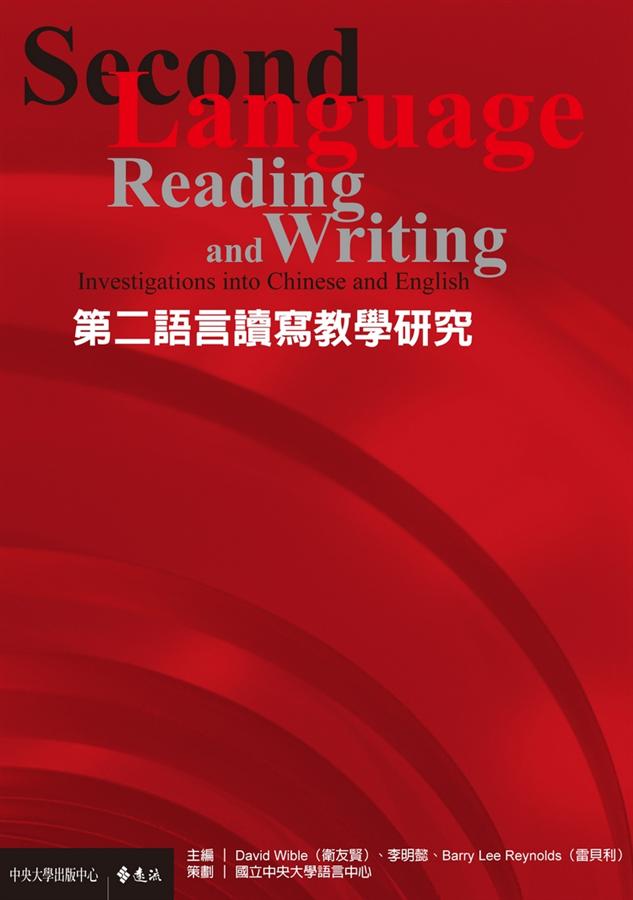
Edited Journal Special Issues
Reynolds, B.L. (in process). Informal and Incidental Second Language Vocabulary Learning [Special Issue]. Education Sciences. (ESCI/SCOPUS)
About this Issue
Coming soon…
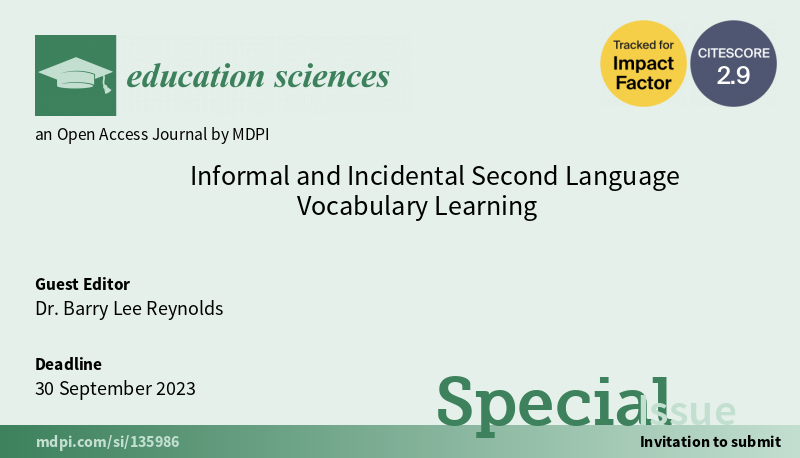
Reynolds, B.L., & Skoufaki, S. (2024). Teaching and learning of academic vocabulary in EMI contexts [Special Issue]. International Journal of TESOL Studies, 6(2).
About this Issue
This special issue focuses on academic vocabulary teaching and learning in English Medium Instruction (EMI) contexts. In this introduction to the special issue, we provide an overview of the articles included and highlight key insights and future directions for research in this field. Given the dominance of English as the language of instruction across educational levels around the world (e.g., Melitz, 2018) and students’ diverse English language learning needs, English language teaching (ELT) and learning in EMI contexts have received considerable research interest. EMI refers to the use of the English language to teach academic subjects in contexts where the first language (L1) of the students is not English. As a recent review of ELT in EMI indicates (McKinley & Rose, 2022), the challenges students face with using the traditional four language skills in EMI settings have been investigated extensively. By contrast, research into students’ learning of vocabulary and grammar has been limited. As applied linguists specialising in vocabulary studies, we wished to redress this imbalance and explore vocabulary teaching and learning in EMI settings. In particular, we were interested in how academic vocabulary (i.e., vocabulary used more frequently in academic writing and speech across disciplines than in non-academic discourse) is learned and taught in EMI contexts. We felt that academic vocabulary is worthy of investigation because, although it poses challenges to both English as a second language and L1 students, it is not typically taught at school (e.g., Beck et al., 2013) or in subject-area courses at university (e.g., Mudraya, 2006; Reynolds et al., 2022, 2023). The result of this endeavour is this special issue of the International Journal of TESOL Studies on Teaching and Learning of Academic Vocabulary in EMI Contexts.
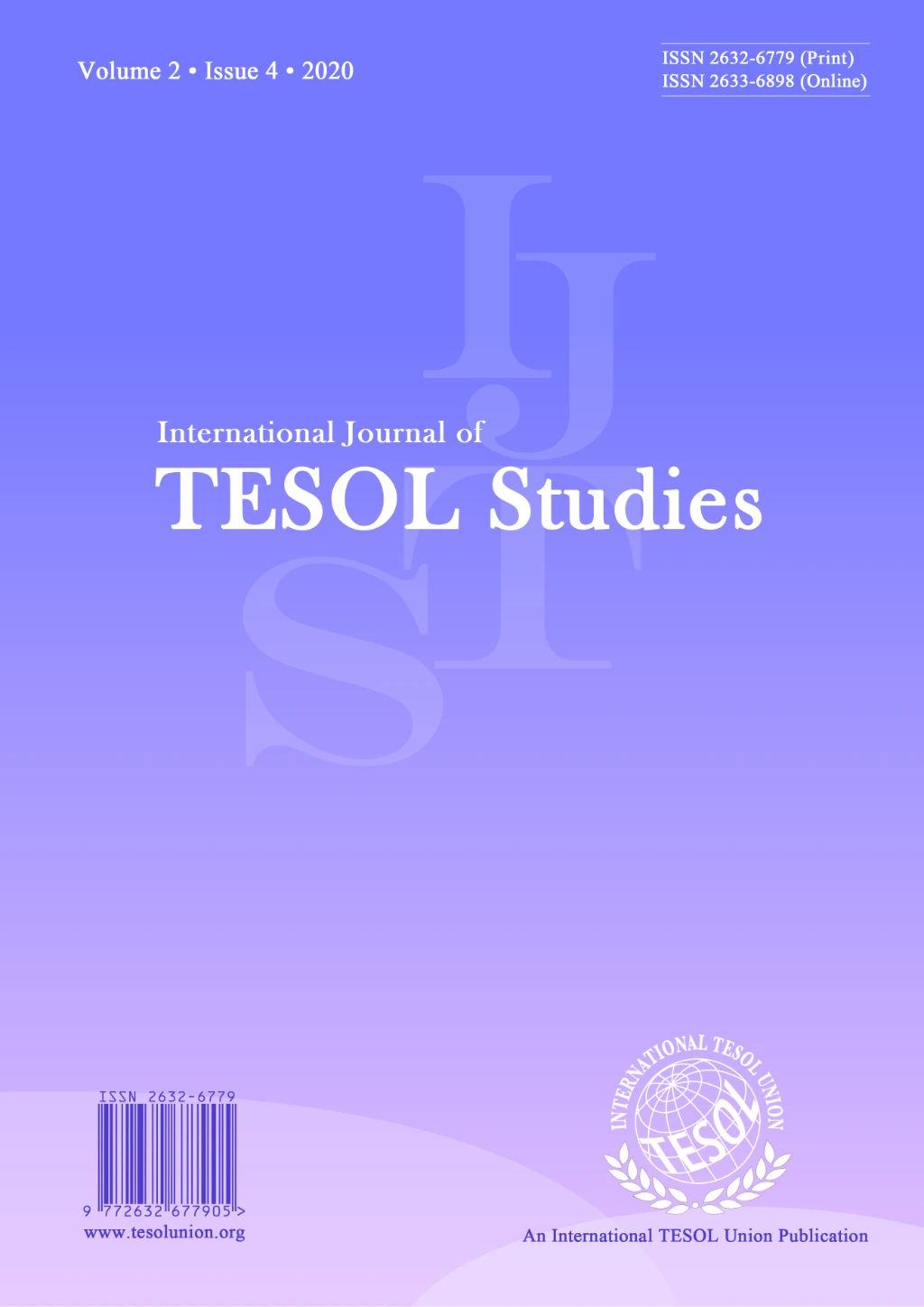
Reynolds, B.L., Shadiev, R., & Li, R. (2024). The Use of Digital Technology for Sustainable Teaching and Learning [Special Issue]. Sustainability, 16. (SSCI)
About this Issue
Sustainable teaching and learning encompass practices where educators equip stu- dents with the skills and strategies needed for lifelong, independent learning beyond the confinement of a traditional classroom and independent of a sole knowledgeable instructor [1]. Teachers who foster sustainable learning engage students in experiential, project-based tasks that necessitate research, critical thinking, and collaboration [2–4]. These educators understand that students should leave their classrooms with an appreciation of how both formal and informal education are continually reshaped by emerging digital tech- nologies [5–7]. This mindset must be instilled in learners from a young age, as they are now exposed to these technologies either independently or through parental mediation [8–10].
As state-of-the-art innovative educational technologies continue to emerge at a rapid pace, their affordances have offered a vast array of opportunities for sustainable learn- ing and instruction [11]. Some of these emerging digital technologies include mobile tools [12–14], social media [15,16], virtual and augmented reality [17], online collaborative tools [18,19], and artificial intelligence [20–22], among others.
Students should recognize that these technologies offer opportunities for independent and autonomous learning practices that were unavailable to previous generations. They need to understand how to leverage these tools to their advantage [3,7,11,23]. There is a pressing need for research that demonstrates how technologies can be harnessed to help students acquire skills for lifelong learning. Thus, this Special Issue aims to highlight how digital technology can ensure sustainable teaching and learning practices in an era marked by uncertainties.
The objective of this Special Issue was to compile pioneering theoretical work and original applications related to the use of digital technology in sustainable teaching and learning. The focus was on learning models and theories that illuminate this crucial dimen- sion, exploring their applications across various educational settings and demonstrating their effectiveness through systematic or empirical data.
For this Special Issue, we initially received 46 submissions from various countries and territories. These submissions were rigorously reviewed by well-known international experts in the field, with each article reviewed by at least three reviewers. After several rounds of thorough evaluation, we selected the twelve best articles that represent the highest quality, suitable for a prestigious journal like Sustainability. These selected articles offer original scientific contributions in the form of theoretical and experimental research, as well as case studies that provide new perspectives on sustainable teaching and learning using digital technology.

Li, R., Reynolds, B.L., You, D., & Vazquez-Calvo, B. (2023). Mobile Assisted Language Learning: Developments, Affordances, and Solutions [Special Issue]. Frontiers in Psychology, 14. (SSCI)
About this Issue
The explosion of mobile technologies has sparked a growing academic interest with numerous research publications on mobile-assisted language learning (MALL). MALL refers to the use smartphones, tablets wearable devices and other portable tools for language learning and teaching (Zhang and Zou, 2020; Li, 2022; Soyoof et al., 2023). These technologies are probed for their potential in creating portable, connective, context-sensitive, location-aware, multifunctional and ubiquitous learning environments. MALL tools have been demonstrated to bolster FL/L2 learners’ skills, enabling learners to overcome spatial and temporal constraints with low-cost and high-quality personalized education. In other words, learners obtain a flexible learning experience and learning materials from anywhere and at any time, while actively engaged in self-paced or collaborative learning activities (Shadiev et al., 2020; Li, 2023a,b). While the benefits of MALL are well-recognized, there exists a need for a deeper exploration into its latest developments, affordances, and solutions. These encompass social, contextualized, gamified affordances, interactive components, user perceptions, implications, and novel technological innovations. This Research Topic spotlights the most recent advancements and solutions in MALL. It contains seven research articles, which can be categorized in three broad categories:
1. Pedagogical impact: four articles utilizing quasi-experiments explore the educational effects of MALL tools.
2. Learner affections: two articles investigated foreign language learners’ affections toward the use of MALL.
3. Teacher perceptions: the remaining one article focused on teachers’ perceptions of MALL with a particular eye on identity reconstruction, attitude toward MALL, and some coping strategies for encountered difficulties.

Reynolds, B.L., & Wei, R.. (2023). Global English education and EAP research in the new era [Special Issue]. International Journal of English for Academic Purposes: Research and Practice, 3(2).
About this Issue
Welcome to the sixth issue of the International Journal of English for Academic Purposes: Research and Practice (IJEAP), an open-access peer-reviewed periodical. IJEAP is pleased to partner with the 2022 Global English Education China Assembly (henceforth ‘the Assembly’) to publish this special issue, which is the second of a total of three special issues/columns of the 2022 Assembly (see also https://tesol.i21st.cn/2023/). Organized by China Daily in partnership with Shanghai International Studies University, the Assembly is a high-level international English Language Teaching (ELT) event held annually in China. The 2022 Assembly, held in Hangzhou (China), brought together over 2,600 ELT practitioners, scholars, and researchers in China and from abroad (Wei & Reynolds, 2023). At the time of writing, the 2023 Assembly is scheduled to be held in Macau (China), and we believe that it will be a great success as well!
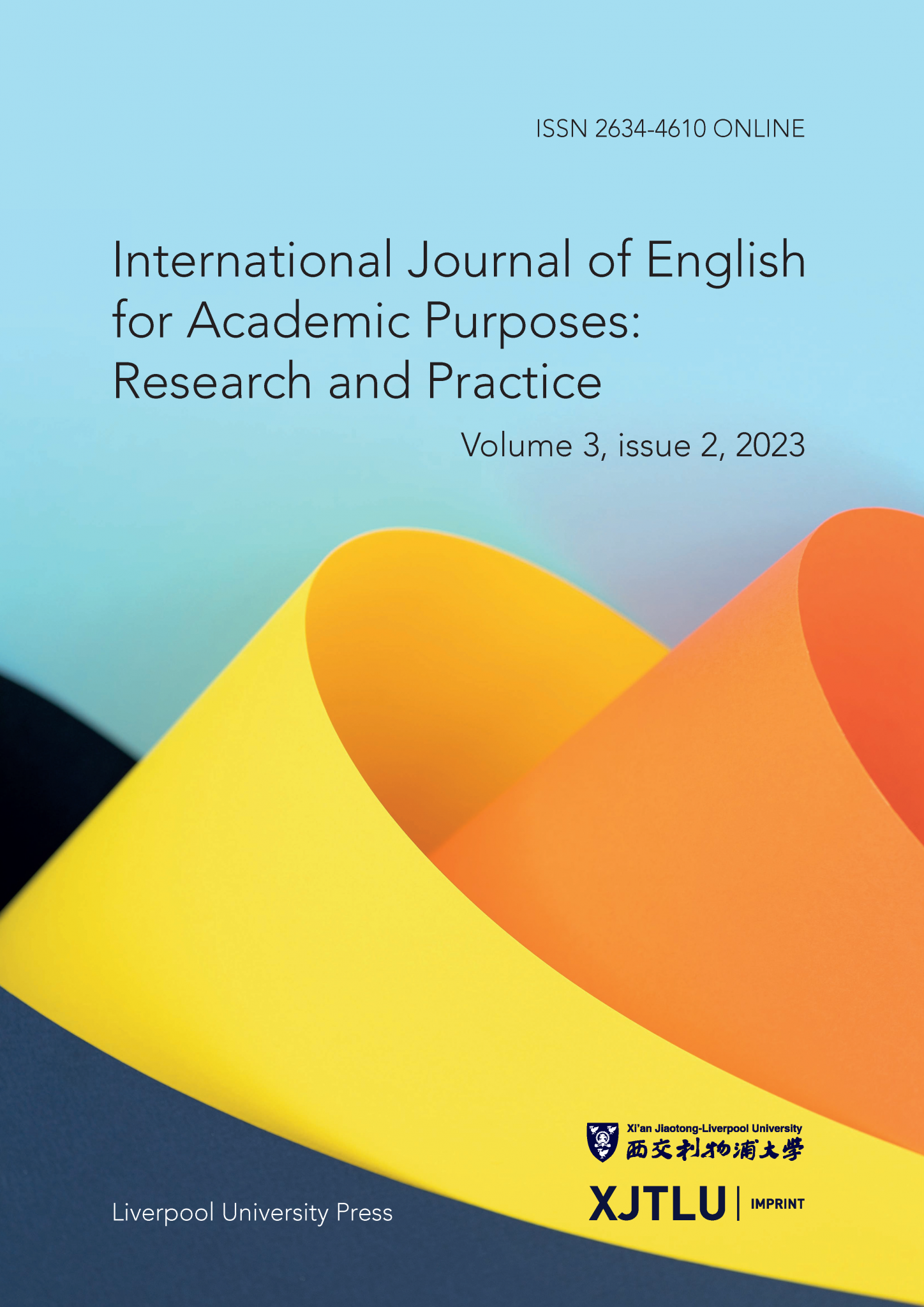
Teng, M.F., & Reynolds, B.L. (2023). Incidental vocabulary learning in practice [Special Issue]. Asian Journal of English Language Teaching, 32(1).
About this Issue
The editors proposed the theme of this special issue, incidental vocabulary learning in practice, to address the long overdue bridging of research and practice within this active area. In recent years, vocabulary learning has received an increasing amount of attention (e.g., Webb, 2020), and the editors took this increased interest as a starting point for exploring what support might be appropriate for incidental vocabulary learning in practice within and beyond the classroom. In order to be able to make suggestions on directions for the most appropriate kind of support for incidental vocabulary learning, it is essential to explore how language learners, particularly in the Asian foreign language context, can be supported for better outcomes. Learning English as a foreign language (EFL) does not have to be difficult. It should be enjoyable. Vocabulary learning requires continual exercise to strengthen learners’ innovative thinking, cognitive processes, communicative proficiency, and ability to infer meaning from context. Thus, we aimed for this special issue to inspire English teachers to consider whether what they do in the classroom prepares learners for meaningful engagement in activities outside the classroom requiring meaning-focused English use. It is essential to find ways to disseminate good practice and, perhaps most importantly, to integrate innovative approaches across curricula, institutions, and contexts to broadly influence vocabulary learning. These concerns prompted this special issue, which aimed to introduce the conceptual and methodological shifts in research to fully explore and understand the challenges of vocabulary instruction and inform effective, enjoyable, and sustainable incidental vocabulary learning.
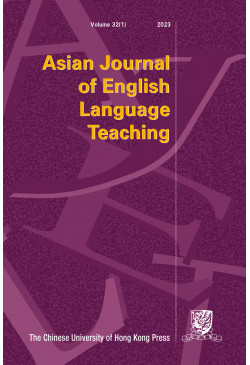
Wei, R.T., & Reynolds, B.L. (2023). TESOL in the new era: Special Column for the 2022 Global English Education China Assembly [Special Column]. International Journal of TESOL Studies, 5(3).
About this Issue
Welcome to the International Journal of TESOL Studies (IJTS) special column for the 2022 Global English Education China Assembly (henceforth “the Assembly”). This is the first of the three special columns of the 2022 Assembly (see also the Call for Papers at the end of this volume). Organised by China Daily in partnership with Shanghai International Studies University, the Assembly is a high-level international English Language Teaching (ELT) event that is held annually in China. The 2022 Assembly held in July in Hangzhou (Zhejiang Province, China) brought together over 2,600 attendees, both on site and online. They were ELT practitioners, scholars and researchers in China and from abroad. On the platform offered by the Assembly, they exchanged experiences and options and shared research.
When the call for full paper submission ended, we had been working in a challenging period of time where one of the world’s largest disruptions to daily life was affecting every sphere of our life. Notwithstanding the stress everyone was facing during the Covid-19 pandemic, contributors to this special column still managed to be very productive. The column features three papers from TESOL experts and researchers from China and beyond. These empirical studies are followed by one interview with one internationally renowned scholar Professor Chuang Wang conducted by Ms. Peng Lin, Secretary-General of the Assembly and Editor-in-Chief of the Assembly Special Columns. As Guest Editors, we feel honoured and pleased to introduce the works of these six researchers (including the prestigious interviewee) that are showcased in this special column. Prior to our introduction, we would like to warmly congratulate these experts for their research completed successfully during the challenging Covid-19 period.

Reynolds, B.L., & Kao, C.-W. (2022). Rethinking the (In)effectiveness of Unfocused Feedback in the L2 Writing Classroom [Special Issue]. Journal of Language and Education, 8(4). (ESCI/SCOPUS)
About this Issue
The issue of whether or not teachers should correct second language learners’ grammatical errors has been hotly contested in the literature. Researchers who studied corrective feedback were particularly interested in determining what kinds of feedback may help students commit fewer errors in subsequent writing. One of the primary points of contention in this discussion is whether language teachers should provide focused (i.e., only one or a few types of grammar errors are targeted for correction) or unfocused written corrective feedback (i.e., all or most error types are corrected). Although focused feedback has been found to be more effective than unfocused feedback (Kao & Bible, 2014), focused feedback has been questioned to ecologically invalid in authentic classrooms (Xu, 2009). The current special issue begins to address this gap in the literature. The authors of the articles included in the present special issue discuss unfocused feedback practices from multiple perspectives. The issue consists of 2 editorials, 11 research papers, 1 opinion paper, and 2 book reviews.
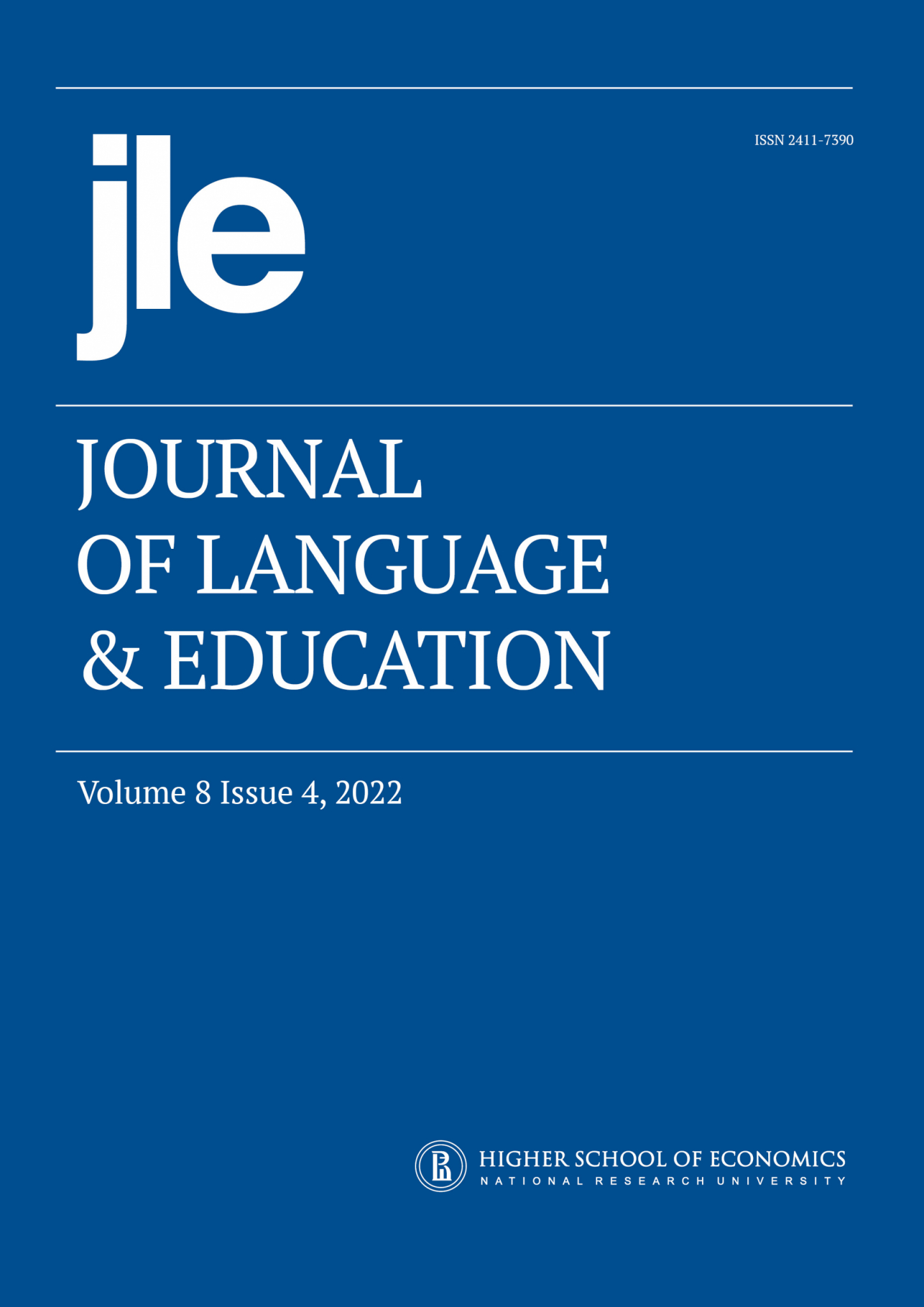
Wei, R., & Reynolds, B.L. (2022). TESOL and New Technology: Opportunities and Challenges [Special Issue]. International Journal of Computer-Assisted Language Learning and Teaching, 12(2). (SCOPUS/ESCI)
About this Issue
Welcome to the International Journal of Computer-Assisted Language Learning and Teaching (IJCALLT) special issue for the 2021 Global English Education China Assembly (hereafter “the Assembly”). The Assembly, a high-level international English Language Teaching (ELT) event in China, has been organised annually by China Daily in partnership with national and overseas academic institutions. The 2021 Assembly, held in July in Hangzhou, Zhejiang Province, China, attracted over 3,000 attendees, both on site and online (Wei & Hu, 2021). We believe that the 2022 Assembly (https://tesol.i21st.cn/2022/), to be held in this summer, will continue to bring together thousands of ELT practitioners, scholars, and researchers, at home and from abroad, to exchange experiences and share research outputs, despite uncertainties brought about by the COVID-19 pandemic. Although many researchers showed interest in the topic of the special issue, only a small number of their submitted papers were able to be included. This special issue is comprised of five articles authored by six second language (L2) researchers based in the Chinese mainland, Hong Kong, Macau, and Taiwan. These papers deal with both pre-tertiary and tertiary education matters related to the opportunities and challenges of online language learning and instruction, multimodal input, and technology enhanced writing instruction.
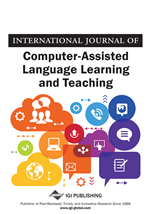
Yang, S., & Reynolds, B.L. (2022). L2 Creative Writing in Asia: Texts, Contexts and Identity Work [Special Issue]. International Journal of TESOL Studies, 4(4).
About this Issue
As the largest, most populated, and most culturally and linguistically diverse continent, Asia booms with opportunities for L2 creative writing. At the same time, there are major hurdles to cross. The first is the deeply entrenched belief that we Asians should desert our Asian ways of thinking in order to write idiomatically. The second is a heavy emphasis on form in writing education, especially under the pressure of exams. The third is the prevalence of what Freire (2000) calls a banking model of writing education in connection to test preparation. For quick results, it is not uncommon for writing teachers to promote and students to practice rote learning. We believe that if writing teachers welcome contact literature, are mindful in nurturing creative writing in their own classrooms, and appreciate their students’ backgrounds as a resource, L2 creative writing can be a powerful correction to the ills committed by formal/form-all education. Hopefully, by pursuing and promoting L2 creative writing, we learn “how we humanise language, while at the same time showing how language humanises us” (Disney, 2012, p. 15). Therefore, in our call to this special issue, we wrote: Although there has been a growing body of literature on the needs, possibilities, benefits and challenges in providing creative writing courses to L2 learners in both ESL and EFL contexts, much remains to be done to theorize the roles of creative writing in foreign language literacy education and to trace students’ growth as writers within specific classroom contexts. What forms can creative writing take? Is providing creative writing in the foreign language writing context another way of promoting imperialist ideas? To what extent is students’ creativity nurtured? How? In which ways does creative writing in a foreign language become a channel of “speaking back”? How does creative writing course in a foreign language fit into individual learners’ life and literacy trajectories? How does creative writing contribute to learners’ ongoing identity work? What do teachers do to facilitate their learners’ creativity through writing in a foreign language? Who are the hidden literacy sponsors and brokers in the process of students crafting their creative works? If creative writing can be viewed from an ideological or a negotiated perspective, what is ideological about it? What negotiation is there? What does creative writing do to learners’ voice and agency? How can a translanguaging perspective contribute to studies of creative writing in a foreign language? What do teachers do individually and collectively in their teaching of creative writing in a foreign language? How do such teaching processes shape teachers’ own professional identities as language teachers and writing teachers? This collection of four articles have responded to some of these important questions.

Reynolds, B.L., & Teng, M.F. (2021). Incidental and Informal Vocabulary Learning [Special Issue]. TESOL Journal, 12(4). (ESCI/SCOPUS)
About this Issue
The idea for the 2021 TESOL Journal Special Issue on Incidental and Informal Vocabulary Learning was the result of our discussions on how to make our research findings accessible to English teachers. Our experiences as teacher educators have underscored the need to provide English teachers with advice on how to make English language study more meaningful to their students. The more engaged we became with local English teachers, the more we understood a need to narrow the gap between in-class and out-of-class English learning. This is difficult because many English teachers experienced borderline painful routes to improving their own English language proficiencies. Unlike the highly motivated English learners that became our next generation of English teachers, we cannot expect all language learners to have the intrinsic motivation to keep progressing when faced with learning difficulties. What often takes time to get across to English teachers (and then for the teachers to get across to parents) is that difficulty should not be equated with learning. Language learning does not have to be difficult, and we argue that it should be enjoyable. Thus, we aimed for this special issue to inspire English teachers to consider whether what they do in the classroom prepare learners for meaningful engagement in activities outside the classroom. We also hoped more English teachers would begin encouraging learners to put to practice the language learned in the classroom by engaging in digital gaming, online social networking, and media consumption, among other meaning-focused and communicative activities.

Reynolds, B.L., & Teng, M.F. (2021). Teaching English Reading and Writing to Young Learners [Special Issue]. Studies in Second Language Learning and Teaching, 11(3). (SSCI)
About this Issue
We aimed for this special issue to offer up empirically supported advice to teachers for tackling some of the challenges in teaching reading and writing to young English as a second (L2) or foreign language (FL) learners. These challenges teachers face when providing instruction to young learners include cognitive development, motivation, attention, strategy use, and assessment (Nunan, 2011). It is now well understood that the teaching of reading and writing to young learners can no longer be equated with the teaching of adult learners (Cameron, 2001). In terms of cognitive development, language learners need to go through significant developmental changes in their learning journey from infancy to adulthood (Richardson, 2019). These differences in language learners’ cognitive development call for a need to design language learning tasks and materials that can fit the developmental stages of learners (Teng, 2020a). Language learner motivation can decline over time due to a lack of clarity in the goals of language learning and potential feelings that effort invested in learning the language has not paid off (Linse & Nunan, 2006). Furthermore, as young learners tend to have short attention spans, activities that can maintain their motivation and involvement are essential (Fenyvesi, 2020). Language learning strategy researchers have focused their attention on adult learners; however, we believe they should begin considering young learners’ language use and learning preferences, as this knowledge could help inform teachers’ instruction (Plonsky, 2019). To provide proper instruction, an educator of young learners must understand these needs. This requires the construction of appropriate language assessment tools, which will allow teachers to gauge learners’ strengths and weaknesses; doing so can further facilitate teacher scaffolding and other forms of feedback (Ma & Bui, this issue). Despite the acknowledged impact that these issues have on the teaching of reading and writing to young learners, we are still lacking in empirical evidence to support many creative and pedagogical decisions made in the young learner classroom (Cameron & McKay, 2010). Our intention in this special issue was to further focus language researchers’ attention on the young learner classroom and to encourage a rethinking of classroom practices for teaching reading and writing.
Reynolds, B.L., & Teng, M.F. (2019). Literacy Development for Primary and Secondary English Language Learners Across the Greater China Region [Special Issue]. The Asian EFL Journal, 23(5). (SCOPUS)
About this Issue
This special issue, Literacy Development for Primary and Secondary English Language Learners Across the Greater China Region, is a timely response to scholars’ and practitioners’ interests in English literacy development for L1-Chinese primary and secondary learners across the Greater China region. Along with the wide acceptance of the English language, education policies in the region have further increased learners’ exposure to English through compulsory lessons, particularly at the primary and secondary levels. Accordingly, the introduction of literacy instruction is happening at an ever increasingly earlier age, resulting in ELT researchers and practitioners seeking routes to develop literacy for primary and secondary learners across the region. The articles and book reviews for this issue are balanced in terms of educational context with half focused on primary education and half focused on secondary education with contributions from scholars in mainland China, Hong Kong SAR, Macau SAR, and Taiwan.
